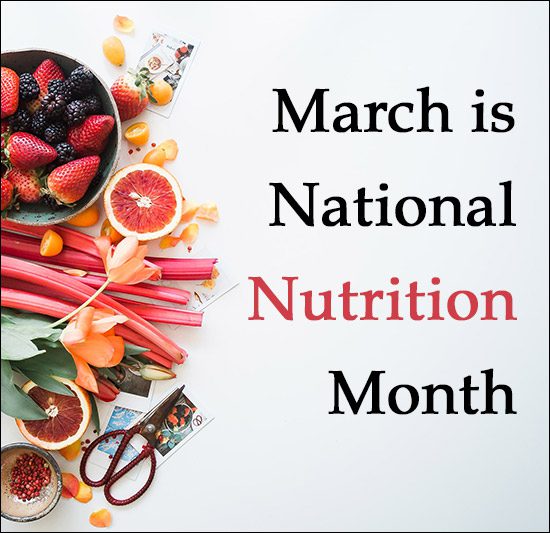March is National Nutrition Month, so it’s the perfect time to examine the role of healthy eating and nutrition for addiction recovery to be successful, and ultimately long-lasting.
Maintaining proper nutrition is one of the most effective ways to live a healthy and productive life.
Though this may sound simple and straightforward, it can be a serious challenge for many Americans, especially those working their way out of the struggles of alcoholism and substance abuse.

Proper Nutrition for Addiction Recovery During National Nutrition Month in March
With March being National Nutrition Month, it makes sense for those in recovery to review current eating habits to ensure the food they eat aligns with their goals of better physical and mental health.
The hard truth about substance abuse and addiction is that it affects virtually every aspect of a person’s mental and physical health.
Not only are people struggling with addiction and dependency issues less likely to be physically active, but alcohol and drugs can also lead to diseases like hypertension, diabetes and some cancers.
It’s not uncommon for people battling an addiction to have poor eating habits, by either not eating enough healthy foods or overeating unhealthy foods.
In both cases, they are not getting enough essential nutrients to maintain proper mental and physical wellbeing.
A poor diet, which affects things like mood, energy and serotonin levels can actually make a person feel worse. This in turn, can trigger cravings to self-medicate with even more alcohol or drugs. So, the cycle becomes self-perpetuating.
What is the Importance of Nutrition on Health?
It might seem obvious that a healthy diet is good for our physical bodies, but what some people might not realize is that there is also a direct link between nutrition and mental wellbeing.
“Multiple studies have found a correlation between a diet high in refined sugars and impaired brain function – and even a worsening of symptoms of mood disorders, such as depression,” Dr. Eva Selhub, a contributor to Harvard Health, writes.
A well-rounded diet filled with protein, whole grains, fruits, vegetables and some dairy helps people manage their weight, stay active, have a stronger immune system, and delay the effects of aging.
All of this adds up to not just improved physical health, but a state of mind better equipped to handle the inevitable emotional stress and anxiety that comes with life.

How Does Substance Abuse Lead to Poor Nutrition?
The damage that drugs and alcohol can wreak on the body is serious. Unfortunately, addiction is such a powerful disease people often ignore the warning signs of failing health until it’s too late.
The toll that addictive substances can take on the body includes some of the following:
Alcohol’s Impact on the Body
Alcohol consumption, especially long-term use, increases the risks of high blood pressure, high cholesterol levels, blood sugar issues and increased body fat.
It also depletes the body’s supply of the vitamin thiamine, which is crucial for kidney, liver, heart and brain function. In extreme cases, alcohol-related thiamine deficiencies can lead to brain damage.
Cocaine and Meth
Cocaine and methamphetamine, as well as other stimulants, are widely known to suppress appetite.
Chronic stimulant users may sometimes go days without eating or sleeping, which only worsens every aspect of their physical and mental health.
Opioids and Heroin
Opioid and heroin addiction often cause severe constipation because it slows down the body’s metabolism and digestive system, making it harder for the body to break down, process, and absorb the nutrients people need from food.
Withdrawal from opioids is particularly difficult, in part because as the drug leaves the system, people often experience diarrhea, nausea, dehydration, and other extreme flu-like symptoms.
Marijuana
For those who smoke weed, one of the more common side effects of marijuana is overeating as a result of the “munchies.”
As a result, weight gain is very often a factor, as well as a lack of essential nutrients because it’s unlikely that users are binging on healthy foods.
How Does Proper Nutrition Help During and After Recovery?
For those entering treatment for drug and alcohol addiction, one significant element to a successful recovery is restoring the necessary vitamins and nutrients to the body, through an individualized dietary plan.
This will vary for every individual because each person’s dietary needs and requirements are not the same.
Nutritionists will focus on a holistic approach to a diet with the goal of nourishing the body, stabilizing mood and reducing stress.
Over a period of days and weeks, sobriety combined with a healthy dose of proper nutrition can help restore regular sleep patterns, normalize mood, and actually reduce cravings for drugs and alcohol.
Dietary education, along with healthier habits developed during treatment, can help people bolster their recovery from addiction even after treatment.
Understanding how nutrition and diet play a role in our overall wellbeing is yet another tool for those in recovery to sustain a balanced, sober and productive life.
It can take time to develop a regular habit of eating healthy foods, and sometimes we all need to re-examine what we eat. March is the perfect time during National Nutrition Month to perform a self-check on our eating habits to see if we could use a tune-up.
Related:
11 Things to Do After Rehab for Alcohol and Drug Addiction
Got Gout? Might be Time to Ditch the Booze





